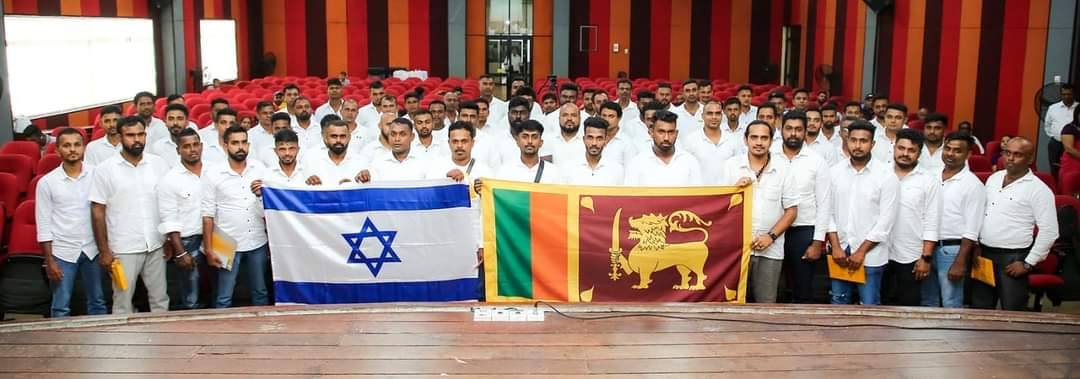
Israel's National Security Council called on Israelis in Sri Lanka to immediately leave tourist areas over the threat of an imminent terrorist attack, as police arrested two people on Wednesday.

Israel's National Security Council called on Israelis in Sri Lanka to immediately leave tourist areas over the threat of an imminent terrorist attack, as police arrested two people on Wednesday.
In a statement on Wednesday, Israel warned citizens currently in Sri Lanka to "avoid openly exhibiting anything that could identify you as Israeli, such as t-shirts with Hebrew writing, or any symbol that discloses your religion or nationality".
It added that there was "current information about a terrorist threat focused on tourist areas and beaches". “The Israeli security establishment ... is in close contact with the security authorities in Sri Lanka and is following the developments,” said the NSC.
The stark warning comes as more diplomatic missions on the island alerted their citizens of a potential terrorist attack targeting tourists on the island.
Germany and Canada joined the US, UK, Australia and Russia in issuing urgent travel advisories on Wednesday.
Read more: Diplomatic missions in Sri Lanka warn 'serious risk' of attack on tourist hot spot
The warnings will bring back memories of the 2019 Easter Sunday attacks that saw suicide bombers hit churches and several luxury hotels on the island, killing hundreds of people, including foreign tourists. At the time, repeated warnings from foreign agencies were reportedly ignored by Sri Lankan authorities.
Sri Lankan police also confirmed that two suspects had been arrested by the Terrorism Investigation Division (TID) on suspicion of connections to the threats.
“One suspect is from Jaffna, while the other is from Colombo. They have been detained and are undergoing interrogation,” said police spokesperson Nihal Thalduwa. It is unclear where the arrests were made and who has been detained, with further details yet to be released.
Tamils on the island have however expressed fear that the arrest of a suspect from Jaffna, could lead to yet another Sri Lankan security crackdown on the North-East.
The scene where two Sri Lankan police officers were killed in 2018.
“When two police officers were killed in 2018, they used it as an excuse to crack down on the Tamil people,” said one Jaffna local, who declined to be named for security reasons.
In that instance, Sri Lankan security forces arrested former LTTE cadres under the much-criticised Prevention of Terrorism Act (PTA) over the murder. Tamil political and community representatives had at the time of arrest maintained that former LTTE cadres were being unfairly scapegoated for the murders, and they were eventually released after more than 6 months of detention. Authorities have since admitted a link had been established between the murder incident and the Islamist extremists who carried out the bomb blasts in Batticaloa and Colombo on Easter Sunday.
“Who’s to say that they won’t just do that again?” he added.
Across much of the Sinhala South at present, anger seems to be pointed not at those who may be behind a terror plot but at a growing number of Israeli tourists who have flocked to the Eastern Province tourist spot.
The area’s MP Rehan Jayawickreme accused local Israeli businesses of operating illegally in Sri Lanka and stoking a “serious security threat that could derail Sri Lanka’s tourism recovery efforts”.
“To those Israelis fuelling this instability, let me make one thing clear: you cannot forcefully and illegally occupy our lands as you have done elsewhere,” he said, calling on Israelis to “respect the laws of this land”.
Muslim traders in the area however told The Hindu last week that Israeli tourists “support businesses here and bring in dollars that help the country boost its foreign reserves”.
“We are just recovering after the cumulative impact of the Easter Sunday bombings of 2019, the pandemic and then our country’s economic crisis. Sending away willing tourists will not help us,” he added.

Sri Lankan workers on their way to Israel.
Successive Sri Lankan governments have also sought to build close ties with Israel. Last month, under the newly elected president Anura Kumara Dissanayake, the government called on Sri Lankans to register for construction jobs in Israel, even the bombardments of Lebanon, the Palestinian territories, and Syria intensified.
Thousands of Sri Lankan workers have also been sent to Israel since it launched its offensive into Gaza. Israel’s farms, particularly in the central and southern regions, have traditionally relied on thousands of Thai and Palestinian workers to cultivate the land and bring in harvests. However, following the Hamas assault on October 7, many Thai workers fled the country, and Palestinian workers have been largely banned from the workforce. As Israel searched for workers, Colombo has stepped up to assist.
Earlier in the year, the Sri Lanka government also opened a new consulate and engaged in expanded trade talks with Israel, despite purportedly calling for a ceasefire to its offensive in Gaza in which tens of thousands have been killed.
Reports of a planned terrorist attack however may cause a blow to the ties that Colombo has sought to build and to Sri Lanka’s fragile economy. The island is still reeling from the 2019 attacks, the coronavirus pandemic and an unprecedented 2022 financial crisis. The latest warnings have dealt that recovery, yet another blow.

.JPG)